Related Research Articles
Jazz is a music genre that originated in the African-American communities of New Orleans, Louisiana, in the late 19th and early 20th centuries, with its roots in blues and ragtime. Since the 1920s Jazz Age, it has been recognized as a major form of musical expression in traditional and popular music. Jazz is characterized by swing and blue notes, complex chords, call and response vocals, polyrhythms and improvisation. Jazz has roots in European harmony and African rhythmic rituals.

Alton Glen "Glenn" Miller was an American big band conductor, arranger, composer, trombone player, and recording artist before and during World War II, when he was an officer in the US Army Air Forces. His civilian band, Glenn Miller and His Orchestra were one of the most popular and successful bands of the 20th century and the big band era. His military group, the Major Glenn Miller Army Air Forces Orchestra, was also popular and successful.

Hard bop is a subgenre of jazz that is an extension of bebop music. Journalists and record companies began using the term in the mid-1950s to describe a new current within jazz that incorporated influences from rhythm and blues, gospel music, and blues, especially in saxophone and piano playing.

Jazz fusion is a popular music genre that developed in the late 1960s when musicians combined jazz harmony and improvisation with rock music, funk, and rhythm and blues. Electric guitars, amplifiers, and keyboards that were popular in rock and roll started to be used by jazz musicians, particularly those who had grown up listening to rock and roll.
Harold McNair was a Jamaican-born saxophonist and flautist.

Horace Ward Martin Tavares Silver was an American jazz pianist, composer, and arranger, particularly in the hard bop style that he helped pioneer in the 1950s.
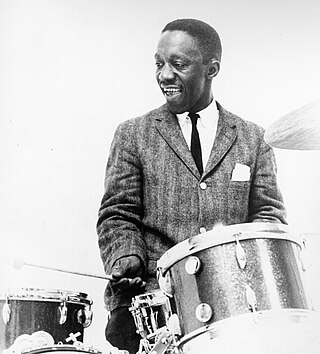
Arthur Blakey was an American jazz drummer and bandleader. He was also known as Abdullah Ibn Buhaina after he converted to Islam for a short time in the late 1940s.

Benny Golson is an American bebop/hard bop jazz tenor saxophonist, composer, and arranger. He came to prominence with the big bands of Lionel Hampton and Dizzy Gillespie, more as a writer than a performer, before launching his solo career. Golson is known for co-founding and co-leading The Jazztet with trumpeter Art Farmer in 1959. From the late 1960s through the 1970s Golson was in demand as an arranger for film and television and thus was less active as a performer, but he and Farmer re-formed the Jazztet in 1982.
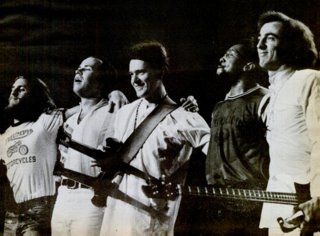
The Mahavishnu Orchestra was a jazz fusion band formed in New York City in 1971, led by English guitarist John McLaughlin. The group underwent several line-up changes throughout its history across its two periods of activity, from 1971 to 1976 and from 1984 to 1987. With its first line-up consisting of musicians Billy Cobham, Jan Hammer, Jerry Goodman, and Rick Laird, the band received its initial acclaim for its complex, intense music consisting of a blend of Indian classical music, jazz, and psychedelic rock as well as its dynamic live performances between 1971 and 1973. Many members of the band have gone on to acclaimed careers of their own in the jazz and jazz fusion genres.
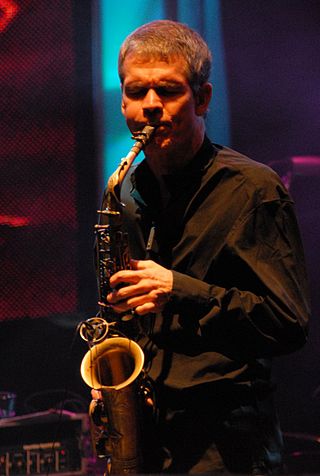
David William Sanborn is an American alto saxophonist. Though Sanborn has worked in many genres, his solo recordings typically blend jazz with instrumental pop and R&B. He released his first solo album Taking Off in 1975, but has been playing the saxophone since before he was in high school.
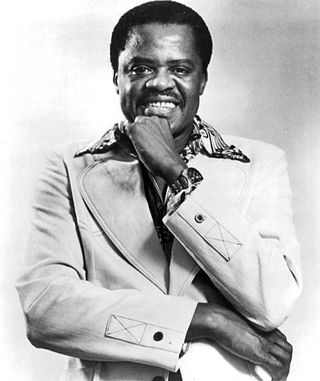
Stanley William Turrentine was an American jazz tenor saxophonist and record producer. He began his career playing R&B for Earl Bostic and later soul jazz recording for the Blue Note label from 1960, touched on jazz fusion during a stint on CTI in the 1970s. He was described by critic Steve Huey as "renowned for his distinctively thick, rippling tone [and] earthy grounding in the blues." In the 1960s Turrentine was married to organist Shirley Scott, with whom he frequently recorded, and he was the younger brother of trumpeter Tommy Turrentine, with whom he also recorded.

Julius Arthur Hemphill was a jazz composer and saxophone player. He performed mainly on alto saxophone, less often on soprano and tenor saxophones and flute.

Nicholas Thomas "Nick" Brignola was an American jazz baritone saxophonist.
Stephen Gregory is an English jazz saxophonist and composer. He plays tenor, alto, soprano and baritone saxophone as well as the flute.

The Airmen of Note is the premier jazz ensemble of the United States Air Force and part of the United States Air Force Band. Created in 1950 to carry on the tradition of the Major Glenn Miller Army Air Forces Orchestra, the "Note" is a touring big band that consists of 18 professional jazz musicians from across the United States.
James Robert Belden was an American saxophonist, arranger, composer, bandleader, and producer. As a composer he may be best known for his Grammy Award winning orchestral jazz recording, Black Dahlia (2001). As producer, he was mostly associated with the remastering of recordings by trumpeter Miles Davis for Columbia Records.
Walt Levinsky was an American big band and orchestral player, composer, arranger, and bandleader. While many of his big band assignments were as lead alto sax player, his favorite instrument was the clarinet.
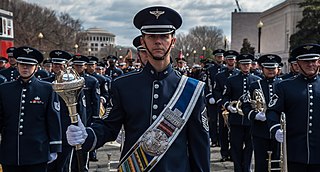
The United States Air Force Band is a U.S. military band consisting of 184 active-duty members of the United States Air Force.
Bob Snyder was a musician known for playing tenor sax, alto sax, clarinet, and flute. He performed with The Airmen of Note, the Glenn Miller Air Force Dance Band, and Lionel Hampton. He also served as staff musician for Motown Records, Stax Records, and WJR radio. He made a very popular clarinet recording of the song "Amazing Grace" at the Grand Hotel on Mackinac Island, Michigan.
While the French horn is primarily used in classical music pieces, in the mid-20th century it broke into the jazz world. While the instrument remains relatively rare, the role of the French horn in jazz has developed from its beginnings in the 1940s through to the 2010s. Note that the expression "horns" in jazz is often used colloquially to refer to all wind instruments used in jazz